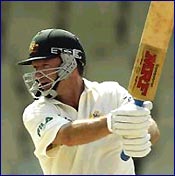The power of two
Daniel Laidlaw
It is a truism that great bowlers make a great captain, and in Glenn McGrath
and Shane Warne, Steve Waugh has two of the very best.
After leading his team to a 3-0 whitewash of Pakistan in Sharjah, Waugh improved his captaincy
record to 28 wins, 6 losses and five draws. The 28 victories trail only
Allan Border (32) and Clive Lloyd (36) for most ever, but from vastly fewer
matches -- Lloyd was in charge for 74 Tests and Border 93 compared to Waugh's
40. Waugh's 70 per cent winning percentage is unmatched by any captain in charge for
15 Tests or more.
 Of course, just how much credit or criticism any captain should receive for
his record is moot. But if Waugh is considered a great captain, then the
chief reason for his side's success can probably be summarised in just two
names: Shane Warne and Glenn McGrath.
Of course, just how much credit or criticism any captain should receive for
his record is moot. But if Waugh is considered a great captain, then the
chief reason for his side's success can probably be summarised in just two
names: Shane Warne and Glenn McGrath.
Warne and McGrath have been the two constants since Waugh's reign commenced
with the West Indies tour in early 1999. For all Australia's batting
riches -- Waugh himself and brother Mark, the extraordinary feats of Adam
Gilchrist, and latterly the Hayden-Langer partnership -- McGrath and Warne
remain the two players who have underpinned the greatness of Waugh's side.
As Waugh said after the third Test against Pakistan, statistics don't always
reflect the true picture, but as another series win is registered so
emphatically that it's difficult to appreciate, it's worth reflecting upon
the statistics of the two bowlers at the heart of Australia's success.
Since the start of Waugh's tenure, Warne has claimed 162 wickets from 36
Tests at 27.22, and McGrath 201 wickets from 42 matches at 19.60. That is,
in effect, nearly one innings of each Test taken care of by McGrath and
Warne alone. Though partly due to the greater number of matches played now,
no other captain in the history of the game has been able call upon two
bowlers as successful as McGrath and Warne.
Waqar Younis and Wasim Akram,
when both playing, come close with their combined 775 wickets, but consider
it: Warne is the second-highest wicket-taker of all time with 477, McGrath
up to eighth on that list and climbing rapidly with 405. With nearly 900
wickets worth of Test experience, it is these two match-winners who truly
separate Australia from their challengers.
 It's no coincidence that in the only series Waugh's teams have failed to
win, either McGrath or Warne have been below their best. Returning from
shoulder surgery, Warne was famously dropped for the fourth Test in the West
Indies in '99, returning just 2 wickets in three matches as Australia had to
fight back to draw 2-2. Compounding the unsteady start to Waugh's captaincy
career, Australia lost 1-0 in Sri Lanka later that year -- this result due to
a batting capitulation, although McGrath could only return 6 wickets at 36.
It's no coincidence that in the only series Waugh's teams have failed to
win, either McGrath or Warne have been below their best. Returning from
shoulder surgery, Warne was famously dropped for the fourth Test in the West
Indies in '99, returning just 2 wickets in three matches as Australia had to
fight back to draw 2-2. Compounding the unsteady start to Waugh's captaincy
career, Australia lost 1-0 in Sri Lanka later that year -- this result due to
a batting capitulation, although McGrath could only return 6 wickets at 36.
In India in 2001, Warne was again hammered for a series return of 10 wickets
at 50.50, while later that year New Zealand proved one of the few teams able
to resist McGrath, as he captured only 5 wickets at 65.40 in a 0-0 draw. The
moral of the story is as Warne and McGrath go, so too does Australia.
While this should not downplay the role of Gillespie, the batsmen or indeed
Waugh's leadership in maintaining Australia's pre-eminent position, there is
no question which two bowlers are most significant to their cause, which in
their individual achievements and those of other team-mates is perhaps
somewhat under-recognised. In the 13 series Australia has played under
Waugh, McGrath or Warne have led the bowling averages in 10 of them.
The Pakistan series demonstrated the extent to which the pair, especially
McGrath, are taken for granted. Gillespie took 3 wickets in his only Test at
39 and Lee five at 46.80. On the other hand, Pakistan's young batsmen for
the most part failed utterly to come to terms with McGrath and
man-of-the-series Warne, with Warne reaping 27 wickets at 12.66 and McGrath
14 at 10.85. Though Bichel also impressed as Gillespie's replacement with 8
wickets at 13.25, remove McGrath and Warne from Australia's attack and the
disparity is not nearly as great.
Since Warne apparently realised he could not take his future for granted, he
has undergone a revival. From the start of the 2001 Ashes series, he has
captured 101 wickets in 17 matches at 22.44, which is more like the 1992-'96
Warne. With the much-publicised loss of weight, his bowling has been
revitalised from the slightly pedestrian to the potent. Of course, he has
played some of his softest opponents during that span -- England, South
Africa, Pakistan -- but the renaissance is no less meritorious for that.
Against Pakistan he even took a wicket with his long-lost flipper, albeit a
lucky one.
 Despite claiming his 400th wicket in the third Test, a phenomenal
achievement, the sense that McGrath is comparatively under-appreciated
remains. Partly it must be due to playing alongside Warne, and partly
because he is an unspectacular fast bowler. As McGrath has said himself, he
doesn't possess terrific pace, doesn't really swing it, and does not move
the ball off the pitch terribly much. Yet it would be facile to say all he
does is bowl the right line and length and put the ball in the right place,
as if this is something anyone can do.
Despite claiming his 400th wicket in the third Test, a phenomenal
achievement, the sense that McGrath is comparatively under-appreciated
remains. Partly it must be due to playing alongside Warne, and partly
because he is an unspectacular fast bowler. As McGrath has said himself, he
doesn't possess terrific pace, doesn't really swing it, and does not move
the ball off the pitch terribly much. Yet it would be facile to say all he
does is bowl the right line and length and put the ball in the right place,
as if this is something anyone can do.
The smooth, efficient action, high delivery from close to the stumps, and
masterful control contribute to the build up of pressure on the batsman. It
is said that batsmen need to know their own games; McGrath surely knows his
more intimately than any other bowler. Opposing batsmen are relentlessly
tested, with McGrath knowing that if he remains patient, he will take
wickets. The sight of top-order batsmen perishing to perfectly pitched
deliveries edged into the slips, or trapped in front by one that seams back,
has become commonplace.
Unlike some other bowlers, McGrath's abilities have made him a strike weapon
all over the world. Whether bowling on the bouncy pitches of Australia and
South Africa, the seamers in England or the flat tracks of the
subcontinent, McGrath's contribution to the Australian attack has rarely
wavered. Moreover, he has been phenomenally consistent; it is difficult to
remember McGrath playing a poor Test.
Against Pakistan, McGrath and Warne both knew wickets were just a matter of
time. When Waqar Younis slogged him across the line, McGrath did not react,
he simply made a wry face, calmly delivered the next one in the same place,
and got the edge to Mark Waugh. Unless England have drawn insight from one
of this duo's few unsuccessful series, the Ashes won't be any different.
More Columns
Mail Daniel Laidlaw